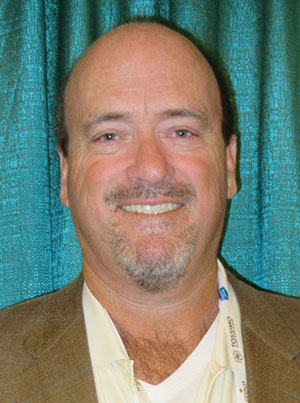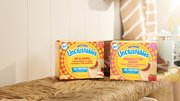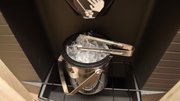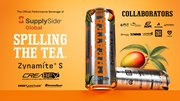Blog
How Perseverance Launched Stuart Daws Career In Coffee
November 3, 2015 | Kevin Daw
TAGS: Vending Times columnist, vending, office coffee service, OCS editorial, coffee industry, coffee market, coffee roasting, Heritage Coffee, Kevin Daw, Stuart Daw career, Stuart Daw book, Canadian Automatic Merchandising Association, Stuart Daw Gold Service Award, Club Caffee |
I was going through a stack of old articles that my father Stuart wrote for a number of publications, including this one, when I came across the draft of a book he had started. He was never sure if anyone would bother with it, and so he never completed it. One part that caught my eye is the story of how Stuart Daw started in the coffee business, 65 years ago this year. I found it funny in a "Mad Men" fashion, and it certainly shows that diligence, a willingness to work and an absence of preconceived notions pay off.
As you'll see, a lot of things had to line up for him to enter the coffee industry in the first place. But enter it he surely did, and the lasting effect he had on coffee in two countries is reflected in the National Automatic Merchandising Association's Legends Award (of which he was the first recipient) and the Canadian Automatic Merchandising Association's Stuart Daw Gold Service Award.
Since this is VT's Coffee, Tea and Water Show issue, I think it a fitting time to publish this reminiscence. I know Stuart told the story at several OCS conferences, some decades ago, and this may bring back some happy memories. For those who did not have the pleasure, I trust you will enjoy it almost as much as I did.
BOOK THREE, CHAPTER 1:
The Coffee Career Begins
Most of us don't think much about it. But whole careers, the entire direction of a lifetime, can be set in motion by one simple fluke -- the fluke of a careless hire. Such was the case with me. The job at Hunt's Limited, a Toronto candy manufacturer, was never more than a stopgap, a bridge to an uncertain future. By training, I was qualified for nothing. With a Great Depression background, and annealed as an early teenager by the uncertainties of World War II, how was a dead-end kid from the prairies of Saskatchewan to know that a young man with lots of energy, a modicum of intelligence and not that hard to look at, could maybe find the good life, after all?
In March of 1950, the ads in the Toronto newspapers were very thin for job seekers. A million war veterans had to be rehabilitated into the Canadian business culture, so "the pickings were lean." But one morning while on a coffee break, I noticed a Toronto Globe and Mail classified section sitting on a table in the cafeteria. My eye caught a small ad simply stating, "Coffee company requires salesman," with a box number to receive written replies.
I knew no sane company would hire anyone with handwriting like mine. But with no mention of the company's name, who should I call, for there were several coffee companies listed in the telephone book? Then, under the counter that held the cafeteria's coffeemaker, I noticed a box of coffee packages with the name Club Coffee Co. on it, and the phone number: EL 1161 (these were the days of the old six-digit numbers).
I dialed, only to be confronted by the bitchiest, most aggressive, truculent voice I was ever destined to hear. No "good morning," only "Club Caffee'' (she always said "caffee" for "coffee").
"I'd like to apply for the position advertised in this morning's Globe and Mail."
Just a moment's hesitation on her part told me I had the right company.
"Yer s'posed to apply in writing," came the angry reply.
"I must apologize, but I am a terrible writer. Could I please speak to the president?"
"He can't be disturbed. He's at the restaurant convention down at the Royal York Hotel."
I thanked her, and that night took the streetcar down to the Royal York. There on the mezzanine floor were several booths, one of which was occupied by Club Coffee. A tow-headed young man was there alone, serving demitasses of coffee in little yellow cups.
I had never so much as sipped from a cup of coffee in my life, but I accepted the young man's offer of one, and toyed with it while getting him into conversation, finding out among other things the boss's name, Jim Fairley. The young man, Mel Warner, informed me that Fairley was upstairs in Club's hospitality room, number 1161. I remember because it was the same as the company's telephone number. I never did ask if that was by chance or by design.
Stepping off the elevator at the 11th floor, I could tell at a distance where 1161 was, for I could hear sounds of the wine, women and song of a hospitality room at a national convention. Nervously I approached the door which was slightly ajar, with smoke billowing through the opening. I gave a tentative knock.
A Grecian restaurateur opened it and peered at me curiously (who the hell knocks at an open hospitality room door anyhow?). "May I speak to Mr. Fairly, please?"
"Jim!" the Grecian restaurateur bellowed over his shoulder.
I was about to meet the man for whom I would work for the next 14 years. I can't recall what I expected, but at that moment a bleary-eyed man with a potbelly and hair drooping over bulging eyes appeared. "Yah?"
"I would like to apply for the job appearing in this morning's Globe and Mail."
"Jesus Christ, I'm too drunk to hire anybody tonight; can't you come back to the office in the morning?"
I arrived at the Club Coffee office at noon by streetcar. The smell of the coffee, just the feel of the place, and I had a strange feeling that this was a good place to be. Perhaps it was the distant memory of the two or three-year-old boy sitting on the floor in the Little House on the Prairie in far-off Saskatchewan, rolling an empty Maxwell Hose coffee tin back and forth with Jack Fieland, the hired man. Or maybe it was the smell of that Maxwell House wafting through the freezing farm home as I and the rest of the family lay bundled in our beds while mother percolated a batch after having broken the ice in the water pail with the bottom of a dipper.
At the Club office, the first person I saw was the woman behind that awful telephone manner, Ethel Cox. She yelled for Jim Fairley (with whom she was in love), who introduced me to John Wyndowe, represented as the sales manager, though as it turned out he really had never sold much or managed anybody.
What ensued was the worst job interview ever conducted by man. John and I sat looking at each other for what seemed an eternity. I felt myself sweating and squirming until Jim Fairley happened to walk by and inquire of John how the interview was going.
"I've never done this before," answered John. "I don't know what to ask him." That was the first of a zillion things that would happen in the future to ensure John's place in my memory as perhaps the most honest man I ever knew.
Jim said, "Well, ask him ... I don't know ... ask him how old he is ... where he was born ... you know."
Having extracted such minutiae after some 15 minutes of mutual torture, John let me go with the warning that they had a bag full of mail with job applications to run through, but that they would call me.
It was then that I had, for the first time in my life, an idea of what I really wanted to do, or at least where I wanted to be. It was something about the whole ambiance, the smell of the place, the warmth and informality of the two "bosses" was entirely new to me.
A few days later, back at Hunts on Friday, March 31, 1950, the phone rang, and my hopes were dashed by John, my interviewer, who told me there were a total of 42 applicants, although only I had applied in person. He brightly assured me that I was their number two choice, that the salesman for the Silex Co. (later Bloomfield Industries), was the winner. His name, Bob something-or-other, was well known in the restaurant trade, as Silex was the premier provider of coffee equipment in that era.
But John assured me that they really liked me, that they would be hiring again in the fall, and that they would call. Oh, sure, I thought, don't call me, I'll call you. But a few hours later, it was John on the phone again.
"Stuart! Do you still want the job?"
"I sure do. But what about the Silex man?"
"Well, first, are you willing to work Saturday morning?"
Silly question to ask a farm boy. "Sure am."
"Well, you got the job. The Silex man won't work on Saturday morning."
Now when I consider that literally thousands of people have had their lives changed forever as my employees, to say nothing of an even greater number impacted in other ways by my being in the coffee business, and of those affected by my private life, with its two marriages and seven children with seven grandchildren, I wonder what the hell the Silex man is doing now, and where I would be if he had just been willing to work Saturday mornings. Ironically, Club Coffee ceased its habit of opening on Saturday mornings a year or so after I started.
But there I was, filling in the necessary forms on Saturday, April Fool's Day, 1950, for a job that would last through some of the best years of my life.
What about pay? In those days you didn't ask, and "benefits" were unheard of. But John volunteered that I was to receive $40 per week, and that I would be responsible for holding the business at all of the 100 regular customers to which they sold coffee, averaging 20 pounds per week, totaling 8,000 pounds monthly. Further, they would pay me 1¢ per pound on all coffee sold to new accounts I might get in the future, calculated semiannually.
And what about transportation? By now, Jim Fairley as well as John was communicating with me, and in fact he was to become my real boss. He told me they would pay five dollars weekly if I just used the TTC (Toronto TransÂportation Commission) streetcars and buses. But they would pay me fifteen dollars weekly if I bought a car. Heading back to my flat by streetcar, I spied MacIntyre Motors, a used car lot at Yonge and Wellesley Streets. There, for nothing down and a price of $300, I bought a 1938 Dodge coupe, a lemon with no bearings and heaven only knows how many hundred thousand miles on it. The body was rotted out from winter driving on salted roads; nonetheless it was transportation. And I had a job. And I was happy.
Furthermore, there was a kind of bonus in all this that meant a lot to me at the time. Jim Fairley showed me a chart of pounds sold from 1907 to 1950, and I was quick to notice that throughout the Great Depression the poundage just kept on growing. People always drink the stuff. This gave me a wonderfully secure feeling, as the conventional wisdom at the time was that you had to have either depression or war, war being the precondition of prosperity.
--As always, may your cup run full, and the brew, exquisite.
 KEVIN DAW is president of Heritage Coffee Co. (London, ON, Canada), a private-label roaster serving the breaktime management industries. A 30-year veteran of OCS, water delivery and vending operations, he has concentrated on coffee roasting for the past two decades.
KEVIN DAW is president of Heritage Coffee Co. (London, ON, Canada), a private-label roaster serving the breaktime management industries. A 30-year veteran of OCS, water delivery and vending operations, he has concentrated on coffee roasting for the past two decades.






